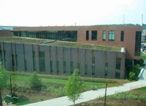Spotlight on Green Schools
Schools are focusing more and more heavily on cutting back on the energy they use and trying to reduce their impact on the environment. The articles on these pages spotlight individual campus energy conservation programs, energy initiatives, solar installations, energy-related technology, HVAC, research, grants, policy, and other topics related to green campuses.
The University of Southern Maine has begun a lighting upgrade designed to save the school more than $70,000 each year.
Cycling Pulse has unveiled Web-based and mobile portal Ride Campus for college and university faculty, staff, and students who commute by bicycle.
The University of Mississippi has completed installation of a solar roof on its Center for Manufacturing Excellence.

The University of Connecticut unveils a new "Classroom Building" that was designed and built with a calculated approach.
A 10-kilowatt solar installation at the University of Arizona is lowering energy bills and enhancing curriculum in some computer science and geology classes.
A utility company has teamed up with a "cleantech" development firm to provide a system that integrates energy load response with energy usage monitoring.
Yuma-based Arizona Western College has begun generating its own electrical power through a solar installation that uses five different types of technologies.
Our environmental challenges are profound, but the solutions don't have to be. Here are 5 quick green initiatives that your institution can implement this year.
Mission College in Santa Clara, CA has completed a solar system designed to save the school approximately $8.5 million in electricity costs over 25 years.
Point Loma Nazarene University in San Diego, CA has completed two solar systems that will save the school as much as $1.6 million over the next 20 years.